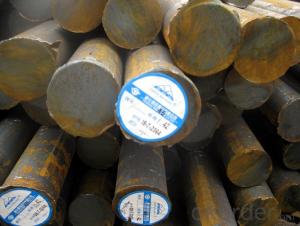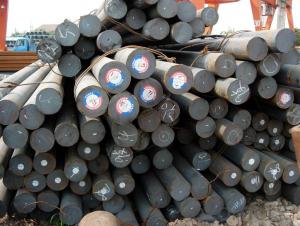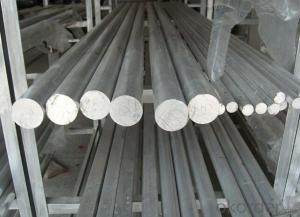Mould Steel Material DIN 1.2713/JIS SKT4/GB 5CrNiMo
- Loading Port:
- China main port
- Payment Terms:
- TT OR LC
- Min Order Qty:
- 25 m.t.
- Supply Capability:
- 10000 m.t./month
OKorder Service Pledge
OKorder Financial Service
You Might Also Like
Item specifice
The details of our Steel
1. Produce Standard: as the GB, AISI, ASTM, SAE, EN, BS, DIN, JIS Industry Standard
2. Produce processes: Smelt Iron -EAF smelt Billet - ESR smelt Billet -Hot rolled or forged get the steel round bar and plate
3. Heat treatment:
Normalized / Annealed / Quenched+Tempered
4. Quality assurance:
All order we can received Third party inspection, You can let SGS, BV,.. and others test company test and inspect our products before Goods shipping.
Product information
1.Specification of 1.2713 steel | |||||||||||||
Round bar | Diameter(mm) | Length (mm) | |||||||||||
50~500 | 2000~5800 | ||||||||||||
Plate | Thickness(mm) | Width (mm) | Length (mm) | ||||||||||
20~400 | 80~1000 | 2000~5800 | |||||||||||
The specification can be customised! | |||||||||||||
2.Chemical compositon of 1.2713 steel | |||||||||||||
NO. | C | Mn | Si | Cr | W | V | P | S | |||||
DIN1.2713 | 0.32~0.45 | 0.20~0.50 | 0.10~0.50 | 0.80~1.20 | -- | 0.80~1.20 | ≤0.030 | ≤0.030 | |||||
3.Delivery condition | |||||||||||||
Standard Number | Annealing | Heat treatment temp( °C ) | HRC Secondar Hardness | ||||||||||
1.2713/SKT4 | 760-780 | Hardening: 1020 Tempering: 530~560 | 54-59HRC | ||||||||||
4.Heat treatment | |||||||||||||
1. Initial preheating to 350-450°C; 2. Second preheating to 650-750°C; 3. Heat to hardening temperature 860-890°Cand hold at temperature; 4. Cooling in hot oil (40-60°C); oil quenched hardness: 54-59HRC; | |||||||||||||
1.EAF: Electric Furnace+LF+VD(Optional) | |||||||||||||
2.ESR: Electric Furnace+LF+VD+Eleroslag Remelted(Optional) | |||||||||||||
5.Application | |||||||||||||
(1) Be widely used in die-casting molds, hot extrusion dies which are for making aluminum castings, and perforation tools, mandrels, press forging dies and plastic dies and so on. | |||||||||||||
(2) Be used in structural parts which are making for aircrafts and rockets of withstanding 400-500°C working temperature. | |||||||||||||
6.Characteristic of H13 steel | |||||||||||||
(1) good strength and high abrasion resistance | |||||||||||||
(2) good quenching | |||||||||||||
Product show

Workshop show

- Q:What are the quality control measures for special steel?
- The quality control measures for special steel typically include thorough inspection and testing of raw materials, monitoring and controlling the manufacturing process, conducting various mechanical and chemical tests, ensuring dimensional accuracy and surface finish, and conducting final inspection and certification to meet specific industry standards. These measures are essential to ensure the desired properties and performance of special steel, as well as to meet customer requirements and ensure product reliability and safety.
- Q:What are the different methods for improving the corrosion resistance of special steel?
- There are several methods for improving the corrosion resistance of special steel. 1. Alloying: One of the most common methods is to add alloying elements to the steel composition. These elements, such as chromium, nickel, and molybdenum, form a protective layer on the surface of the steel, preventing corrosion. Stainless steel, for example, contains a high amount of chromium, which forms a passive film that protects the steel from corrosive environments. 2. Surface treatments: Various surface treatments can be applied to special steel to enhance its corrosion resistance. These treatments include electroplating, hot-dip galvanizing, and chemical passivation. Electroplating involves coating the steel with a layer of metal, such as zinc or nickel, which acts as a sacrificial anode, protecting the steel from corrosion. Hot-dip galvanizing involves immersing the steel in molten zinc, forming a durable, corrosion-resistant coating. Chemical passivation involves treating the steel with a solution that removes surface impurities and forms a protective oxide layer. 3. Protective coatings: Applying protective coatings can significantly improve the corrosion resistance of special steel. Coatings such as paint, epoxy, or polyurethane can act as a barrier, preventing moisture and corrosive substances from coming into contact with the steel surface. These coatings can be applied by spray, dip, or powder coating methods. 4. Heat treatment: Heat treatment can modify the microstructure of special steel, improving its corrosion resistance. Processes such as annealing, quenching, and tempering can alter the steel's properties, making it more resistant to corrosion. Heat treatment can also relieve internal stresses, which can contribute to corrosion. 5. Environmental control: Controlling the environment in which the special steel is used can also help improve its corrosion resistance. This includes measures such as maintaining proper humidity levels, controlling pH, avoiding exposure to corrosive chemicals, and implementing effective ventilation systems. By minimizing the exposure of special steel to corrosive elements, its corrosion resistance can be enhanced. Overall, a combination of these methods can be employed to improve the corrosion resistance of special steel, ensuring its longevity and performance in corrosive environments.
- Q:What are the properties of corrosion-resistant alloy steel?
- Corrosion-resistant alloy steel possesses properties such as high resistance to corrosion, oxidation, and rusting, making it suitable for applications in aggressive environments. It exhibits excellent strength and durability, even in harsh conditions, while maintaining its corrosion resistance. Additionally, it can withstand high temperatures and pressures, making it ideal for industries like oil and gas, chemical processing, and marine applications.
- Q:What are the main corrosion resistance properties of special steel?
- The main corrosion resistance properties of special steel include high resistance to rust, oxidation, and chemical attack. It can withstand harsh environments, such as exposure to saltwater, acids, and alkalis, without significant degradation. Additionally, special steel often possesses a passive oxide layer on its surface, which acts as a protective barrier against corrosion.
- Q:What are the thermal conductivity properties of special steel?
- Special steels, also known as alloy steels, exhibit varying thermal conductivity properties depending on their composition and specific heat treatment. The thermal conductivity of special steel generally ranges from 10 to 50 W/mK. The thermal conductivity of steel is primarily influenced by its carbon content, alloying elements, and microstructure. Carbon acts as a thermal conductor in steel, increasing its thermal conductivity. However, alloying elements such as chromium, nickel, and molybdenum can reduce the thermal conductivity of steel due to their lower thermal conductivity compared to iron. Additionally, the microstructure of special steel plays a crucial role in determining its thermal conductivity. Heat treatments such as quenching and tempering can alter the microstructure, affecting the thermal conductivity of the steel. For example, steels with a higher carbon content and a martensitic microstructure tend to have higher thermal conductivity compared to steels with lower carbon content and a ferritic or pearlitic microstructure. It is important to note that the thermal conductivity of special steel can also be influenced by other factors such as impurities, grain size, and the presence of defects. These factors can either enhance or reduce the thermal conductivity. In summary, the thermal conductivity properties of special steel can vary depending on its composition, heat treatment, and microstructure. Therefore, it is essential to consider these factors when evaluating the thermal conductivity of special steel for specific applications.
- Q:Can special steel be used in the oil and gas industry?
- Yes, special steel can be used in the oil and gas industry. Special steels such as stainless steel, duplex stainless steel, and alloy steel are commonly utilized in this sector due to their high strength, corrosion resistance, and ability to withstand extreme temperatures and pressures. These materials are extensively used in various applications, including pipelines, offshore platforms, storage tanks, and drilling equipment, to ensure safety, reliability, and longevity in oil and gas operations.
- Q:Is the steel column of the steel structure HM a special steel?
- The mid flange H section steel HM (M for Middle English prefix) in GB/T 112631998 this standard inside, not special steel;
- Q:How does special steel contribute to the aerospace fastener industry?
- The aerospace fastener industry relies heavily on special steel due to its ability to offer high strength, durability, and resistance to extreme conditions. These fasteners are essential for keeping different parts of an aircraft together, ensuring the aircraft's structural integrity and safety during flight. The utilization of special steel in their manufacturing allows them to meet the rigorous demands of the aerospace industry. Maintaining strength at high temperatures is one of the significant advantages of special steel in the aerospace fastener industry. Considering that aircraft engines operate at extremely high temperatures, the use of special steel fasteners ensures that they can withstand these conditions without compromising their integrity. This is crucial for maintaining the reliability and safety of the aircraft, as any failure of the fasteners could have catastrophic consequences. Apart from temperature resistance, special steel also possesses exceptional strength and corrosion resistance. Aerospace fasteners made from special steel can withstand the immense forces and stresses experienced during flight, ensuring that the components remain securely fastened together. Moreover, they exhibit high resistance to corrosion, which is of utmost importance considering the exposure of aircraft to harsh environmental conditions such as moisture and chemicals. The unique properties of special steel also make it possible to produce lightweight fasteners without sacrificing their strength. Weight reduction is a primary concern in the aerospace industry, as it directly affects fuel efficiency and overall performance. By utilizing special steel, manufacturers can design fasteners that are simultaneously strong and lightweight, contributing to the ongoing efforts of reducing weight in modern aircraft. Furthermore, special steel allows for the production of fasteners with precise dimensions and tight tolerances. This is crucial for achieving a secure fit between components, minimizing vibrations, and preventing potential damage caused by movement during flight. The accuracy and reliability of special steel fasteners play a vital role in maintaining the structural integrity and safety of the aircraft. In conclusion, special steel plays a significant role in the aerospace fastener industry by providing the necessary strength, durability, temperature resistance, and corrosion resistance required for aircraft applications. Its unique properties enable the production of lightweight yet robust fasteners, ensuring the structural integrity and safety of modern aircraft. Without the utilization of special steel, the aerospace industry would face substantial challenges in meeting the demanding requirements of aviation.
- Q:What are the applications of special steel in the automotive supply chain?
- Special steel has various applications in the automotive supply chain. It is commonly used in the production of critical components such as engine parts, axles, gears, and suspension systems. Special steel provides high strength, durability, and corrosion resistance, contributing to improved performance and safety in vehicles. Additionally, it enables weight reduction, enhancing fuel efficiency and reducing emissions. Overall, special steel plays a crucial role in enhancing the reliability, efficiency, and sustainability of the automotive industry.
- Q:How does special steel perform in low-temperature environments?
- Special steel performs exceptionally well in low-temperature environments. It exhibits excellent toughness, high strength, and remarkable resistance to brittle fracture, which makes it suitable for various applications in extreme cold conditions. Additionally, special steel maintains its mechanical properties even at sub-zero temperatures, ensuring reliability and durability in challenging environments.
1. Manufacturer Overview |
|
|---|---|
| Location | |
| Year Established | |
| Annual Output Value | |
| Main Markets | |
| Company Certifications | |
2. Manufacturer Certificates |
|
|---|---|
| a) Certification Name | |
| Range | |
| Reference | |
| Validity Period | |
3. Manufacturer Capability |
|
|---|---|
| a)Trade Capacity | |
| Nearest Port | |
| Export Percentage | |
| No.of Employees in Trade Department | |
| Language Spoken: | |
| b)Factory Information | |
| Factory Size: | |
| No. of Production Lines | |
| Contract Manufacturing | |
| Product Price Range | |
Send your message to us
Mould Steel Material DIN 1.2713/JIS SKT4/GB 5CrNiMo
- Loading Port:
- China main port
- Payment Terms:
- TT OR LC
- Min Order Qty:
- 25 m.t.
- Supply Capability:
- 10000 m.t./month
OKorder Service Pledge
OKorder Financial Service
Similar products
New products
Hot products
Hot Searches
Related keywords






























